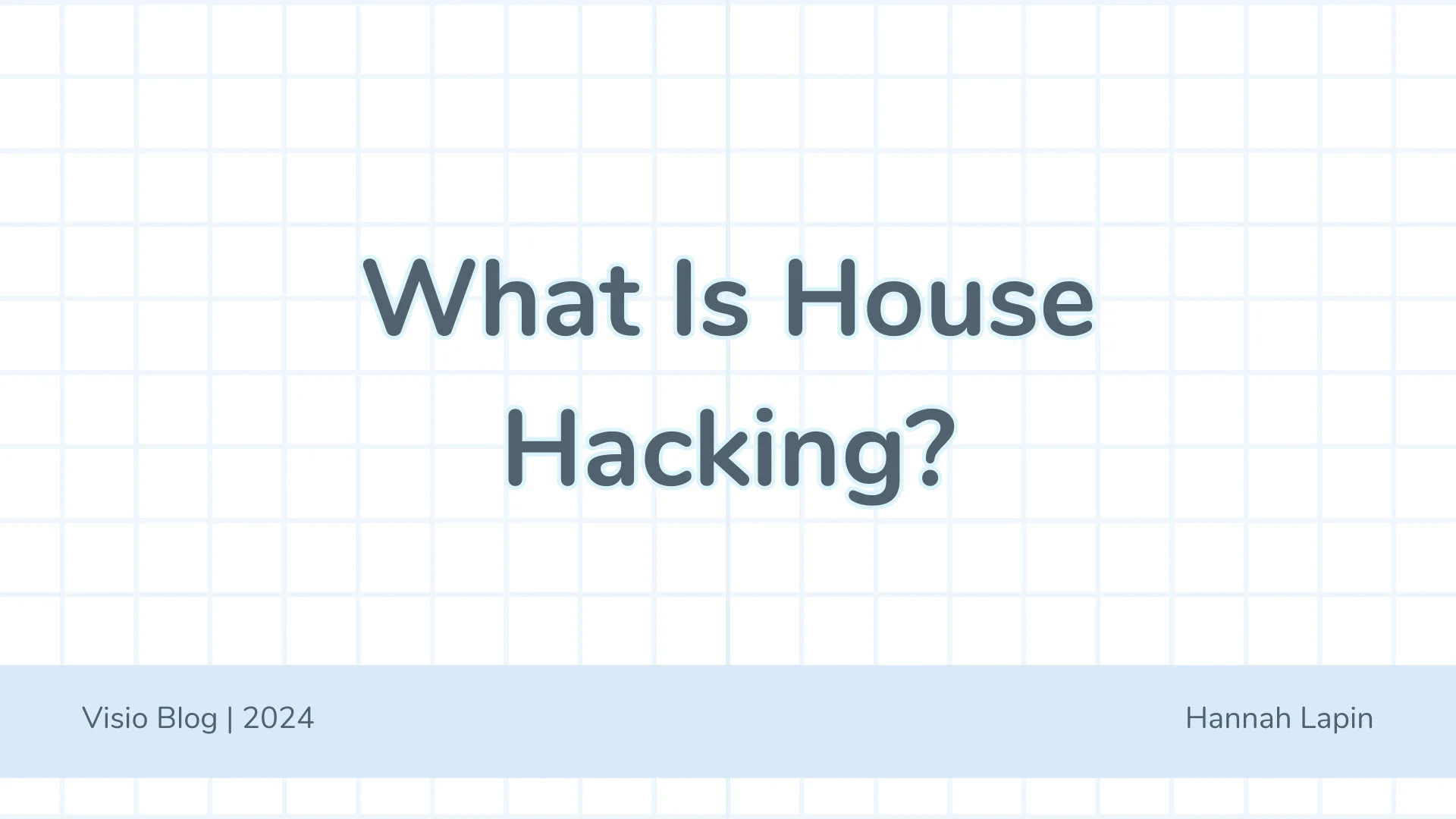Upgrading your real estate investment portfolio solely on your rental income can be difficult, particularly if you’re making a monthly mortgage payment on your primary residence at the same time. This is why many choose to combine their living space with their cash flow through house hacking.
House hacking allows you to generate income by purchasing a multifamily property, living in one unit, and converting the other parts of the property into rental units. You’ll make extra income, save money on housing, and gain financial freedom, all while building equity in your investment property
Why You Should House Hack
With housing costs on the rise, it may feel impossible to start investing, especially when you need to pay for your own housing expenses in addition to affording a down payment on a new property. Thankfully, a house hack can be a great way to lower down payments and boost your net operating income.
In terms of real estate investing, the house hacking strategy is both efficient and affordable. You reduce your housing costs by using your monthly rental income to afford your mortgage payments, setting aside the rest as passive income.
When purchasing a single-family home as a real estate investment, you have a monthly payment on both properties, but house hackers use their own rent payments to cover their housing expenses.
There is only one down payment to cover for both your own home and that of your investment. The purchase price of a duplex is also comparable to that of a single-family house, though they are less common on the housing market.
Additionally, your property management expenses will be lower than for other multi-unit properties because you are living on-site at the house hack property, making you available for your tenants more often. You likely will not need a property management company to check up on the property, further improving your cash flow.
Benefits of House Hacking
House hacking comes with numerous benefits for real estate investors, as it essentially turns your own house into an income-generating investment.
More Flexibility
A house hacker has their monthly mortgage payments directly covered when they collect rent, which reduces their housing cost and increases their income. As they only have one property that they also live in, their property taxes will be lower.
Additionally, should you purchase your own single-family home later on, you will still be generating passive income from your current tenants and can then double your cash flow by renting out your old unit. This gives you the freedom to choose what is best for your financial situation, knowing that your real estate is still generating money during the transitional period.
Potential Tax Benefits
House hacking also provides tax benefits that would not be possible if you had your own separate residence. Even if you do not have a registered business, your rental units are considered a business, meaning that you can deduct business-related expenses just as you would when managing other rental properties.
If you have a duplex and half of it is rental property, you will be able to write off 50% of your tax-deductible expenses, such as landscaping, snow removal, and repairs. You can also leverage depreciation to further reduce your tax burden.
Additionally, if you have lived in one unit for two out of the last five years, and then decide to move out and sell the property, you can utilize the 1031 exchange to avoid capital gains tax.
Finally, there is property tax. If you live in a multifamily property without having your own separate residence, you are only paying one set of property taxes, not two. This can greatly alleviate your costs for an investment property, all while providing you with rental income and a place to live.
Easier to Finance
A house hack has far more financing options than the typical investment, particularly when it comes to government-backed loans.
You can purchase a property with up to four units using Federal Housing Administration (FHA) loans or VA loans. An FHA loan is well known for having affordable down payments, and a VA loan requires no down payment at all. The mortgage insurance premium (MIP) for an FHA loan is often much cheaper than mortgage insurance with conventional loans.
These lower upfront costs can be incredibly helpful when you’re just starting out on your house hacking journey.
You’re also eligible for a conventional loan, which can be more difficult to secure for real estate investing. As with government-backed loans, Fannie Mae and Freddie Mac will insure loans for properties with four units or less.
The down payment for these types of loans is typically lower than down payments for investment loans, though an investment loan allows you to go above the limits imposed by Fannie Mae and Freddie Mac. Those extra funds can help you afford larger properties that have a higher net operating income.
House Hacking Strategies
The savvy real estate investor has numerous options when it comes to house hacking, and it depends on their personal comfort of sharing living space with tenants, as well as their budget. With creativity, you can make nearly any type of property work. It simply comes down to whether you have the funds to turn it into a strong money-maker.
Short-Term Rentals
A short-term rental can be a good option, particularly as it’s well-known for having an excellent profit margin. With this form of house hacking, you’ll be readily available to your customers to attend to any questions they may have, and you can monitor them to ensure that they are respectful toward your property.
You will purchase either a duplex or a larger multistory building, then rent out one or more of the units to short-term tenants. It can be an exciting opportunity to develop strong rental income and sharpen your customer service skills, though it does require more work with marketing and business management.
This also necessitates more careful screening than if you had a separate vacation rental.
Multifamily Properties
Buying a multifamily property is one of the most common house hacking strategies. You would live in one unit as you rent the other to a long-term tenant. You will collect monthly rent that can be used to finance your mortgage payment and other living expenses.
Most house hackers will choose a duplex to start with, as duplexes are quite affordable and can be found with a bit of work in nearly every market. It’s best to buy an existing one rather than build a new one, as they can be just as expensive as your typical suburban home. With some renovations, you can turn it into an attractive property for both yourself and a potential tenant.
Another option is to buy a larger apartment block with multiple apartments and then live in one of them while collecting income from the others. If it has more than four units, you will likely need a specialized investment loan rather than a traditional loan from a bank.
Investors who choose this route typically work with a property management team rather than managing it themselves in order to ensure good service for all tenants.
Accessory Dwelling Units (ADU)
An accessory dwelling unit is a smaller building you rent. Garage spaces that have been renovated to become living units are popular, as are mobile homes and prefab cabins. With this, you do not directly share space with the tenant, but they are still on the property.
In some places, like New York City, you can get a tax credit for building and renting out an ADU, and the same may apply in other municipalities that have a severe housing shortage.
They are much cheaper to build than the average home, and they can be added to an existing property on a larger lot. You may only need to spend $20,000 or less in order to create a habitable and profitable space to rent out, all while having your own space to enjoy.
Single Family Homes
In some cases, a house hacker may buy a single-family home with multiple bedrooms and then rent out one of the rooms to a tenant, who then lives with them.
One of the benefits of this is that the property value for single-family residences is typically higher because they are in greater demand, so when you are ready to sell, you are more likely to make a good return on investment because you can market to a wider range of buyers.
You could sell to another real estate investor or to an individual, whereas when you have a multi-unit building, you are typically only marketing to other investors.
How to Successfully House Hack
While there are many benefits of house hacking, there can be downsides as well, and you need to read up on the pitfalls you may face.
Safety is a primary concern when it comes to house hacking. While every investor needs to worry about whether a potential tenant will damage their rental property, as this is also your primary residence, you must be sure that you trust the tenant. Screening renters becomes even more critical in this circumstance.
Additionally, you need to worry about legal concerns, such as the Fair Housing Act, which is meant to prevent housing discrimination. As you refine your house hacking strategy, you will become familiar with the many legal obligations you have toward tenants.
Once you’re familiar with these elements of house hacking, it’s time to begin looking for the proper investment.
Calculate Your Investment
As with other forms of real estate investing, you must run the numbers to ensure that house hacking is the right option for you. Assess the purchase price of a potential house hack, then estimate the rental income you would get from the units you will not be occupying in order to identify whether you will make enough to satisfy your living expenses.
The Debt Service Coverage Ratio (DSCR) will be helpful here, but remember that you must divide your rental income in half or subtract the income from one of the units in order to accurately assess how well the property will pay your monthly mortgage payment.
Find a Property
If you do not have an existing property that you intend to renovate for house hacking, you’ll need to work with a good real estate agent and discuss your particular needs for your new real estate investment.
When hunting for an existing property, you’ll want to avoid some common house hacking mistakes, such as buying a building that does not have a separate entrance for the tenant and property owner. This can be a safety issue, particularly if you want to turn your building into a short-term rental. A good duplex typically has this, as does a larger multi-unit property.
Choose a property that has excellent soundproofing between the units so that you’re not bothered by your tenants, particularly if you intend to live on the first floor and rent out the second one. This can save you a great deal of hassle when it comes to smooth relations between you and your tenant.
Lastly, focus on the potential for tenancy, just as with other forms of real estate investing. When house hacking, particularly for vacation rentals, you want a property that is in an attractive location with plenty to do nearby, as well as one with a low crime rate. If this will be a long-term tenancy, consider school districts, parks, and amenities like shopping centers.
Make Repairs
House hacking typically involves a few repairs to bring the home up to a rentable standard. Always get a home inspection before you sign anything, as this will reveal issues that may scuttle your house hacking plans. Avoid any property with serious structural issues that could be expensive or impossible to repair.
When you decide what will need to be fixed, work with a good contractor to assess the problems and develop a plan of action. You will want to get multiple quotes from different contractors and reach out to those in your investment network to identify any difficult contractors that overcharge.
Repairs can include simple things like fixing up flooring or rehabbing the kitchen, or they may require more intensive work, such as adding more soundproofing between the units. This depends on the condition of the property and your personal preferences.
It’s not necessary to make the two units identical if you intend to do house hacking for the long term. Fix the side of the property that you will be living in to your preferences, then ensure that the other areas are habitable and attractive.
Finance Your House Hack
Most house-hacking investors do not have the funds to pay for their property outright, so they turn to financing. There are several options here, including FHA loans, VA loans, and more investment-specialized loans such as DSCR loans from private lenders like Visio Lending.
DSCR Loans
DSCR loans are real estate investment loans that work well for income-generating properties, such as those used in house hacking.
Instead of relying on the investor’s personal financial profile, a DSCR uses the Debt Service Coverage Ratio, which compares the income generated to the PITIA (principle, interest, taxes, insurance, association dues).
If the ratio is below 1, that means that the property has negative cash flow and will likely not cover its debts; most lenders want a ratio of 1.2 or higher, meaning that the property is making 1.2 times in rent as what it is paying in a mortgage and insurance.
The benefit of getting a DSCR loan for house hacking is that it can be underwritten much faster than a conventional loan, as there is less investigation into the house hacker’s credit, tax returns, and bank statements. Rather than the lengthy, months-long process, you can typically get approved in 45 days or less, sometimes much faster.
Rental Property Loans
Another option is rental loans, which can include house hacking properties. Like DSCR loans, these look at the profitability of the venture rather than the creditworthiness of the investor, allowing for faster approval times and a higher approval chance. As long as the property itself can perform well and finance itself, you are likely to be approved.
House hacking can be a highly lucrative, efficient, and effective way to invest in property while still covering your own expenses. A house hack allows you to begin building equity faster by covering the mortgage, and it reduces your costs because you are only financing one property, not a primary residence and an investment.
At the same time, you must choose a property carefully for safety, marketability, and profitability. Working with a good realtor and spending time identifying the profit margin will serve you well, as will careful, targeted repairs on the units that you intend to rent out.
If you’re ready to begin house hacking, contact Visio Lending for more details on our affordable and efficient investment loans.
We provide prompt underwriting, commonsense qualification requirements, and flexible terms made to meet investors’ needs. We have offered millions of dollars in loans across the country, and we look forward to helping you find your dream house hack.






